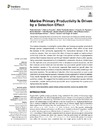Identificador persistente para citar o vincular este elemento:
https://accedacris.ulpgc.es/jspui/handle/10553/69719
| Título: | Marine primary productivity is driven by a selection effect | Autores/as: | Cermeño, Pedro Chouciño, Paloma Fernández-Castro, Bieito Figueiras, Francisco G. Marañón, Emilio Marrasé, Cèlia Mouriño-Carballido, Beatriz Pérez-Lorenzo, María Rodríguez-Ramos, Tamara Teixeira, Isabel G. Vallina, Sergio M. |
Clasificación UNESCO: | 241705 Biología marina | Palabras clave: | Marine Phytoplankton Primary Productivity Resource Use Selection Effect Species Richness, et al. |
Fecha de publicación: | 2016 | Publicación seriada: | Frontiers in Marine Science | Resumen: | The number of species of autotrophic communities can increase ecosystem productivity through species complementarity or through a selection effect which occurs when the biomass of the community approaches the monoculture biomass of the most productive species. Here we explore the effect of resource supply on marine primary productivity under the premise that the high local species richness of phytoplankton communities increases resource use through transient selection of productive species. Using concurrent measurements of phytoplankton community structure, nitrate fluxes into the euphotic zone, and productivity from a temperate coastal ecosystem, we find that observed productivities are best described by a population growth model in which the dominant species of the community approach their maximum growth rates. We interpret these results as evidence of species selection in communities containing a vast taxonomic repertory. The prevalence of selection effect was supported by open ocean data that show an increase in species dominance across a gradient of nutrient availability. These results highlight the way marine phytoplankton optimize resources and sustain world food stocks. We suggest that the maintenance of phytoplankton species richness is essential to sustain marine primary productivity since it guarantees the occurrence of highly productive species. | URI: | https://accedacris.ulpgc.es/handle/10553/69719 | ISSN: | 2296-7745 | DOI: | 10.3389/fmars.2016.00173 | Fuente: | Frontiers in Marine Science [ISSN 2296-7745], v. 3 (173) |
| Colección: | Artículos |
Citas SCOPUSTM
33
actualizado el 08-jun-2025
Citas de WEB OF SCIENCETM
Citations
31
actualizado el 22-feb-2026
Visitas
82
actualizado el 10-ene-2026
Descargas
96
actualizado el 10-ene-2026
Google ScholarTM
Verifica
Altmetric
Comparte
Exporta metadatos
Los elementos en ULPGC accedaCRIS están protegidos por derechos de autor con todos los derechos reservados, a menos que se indique lo contrario.
